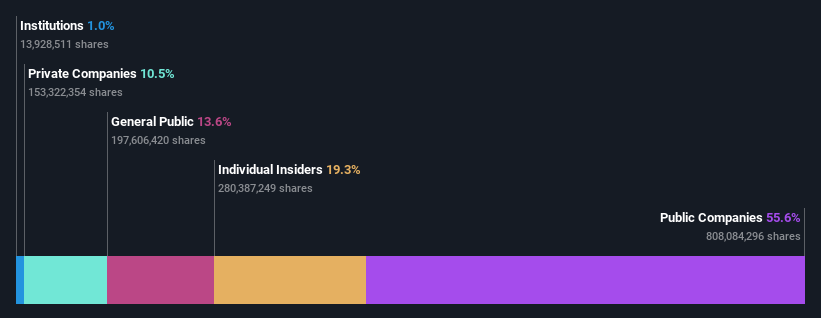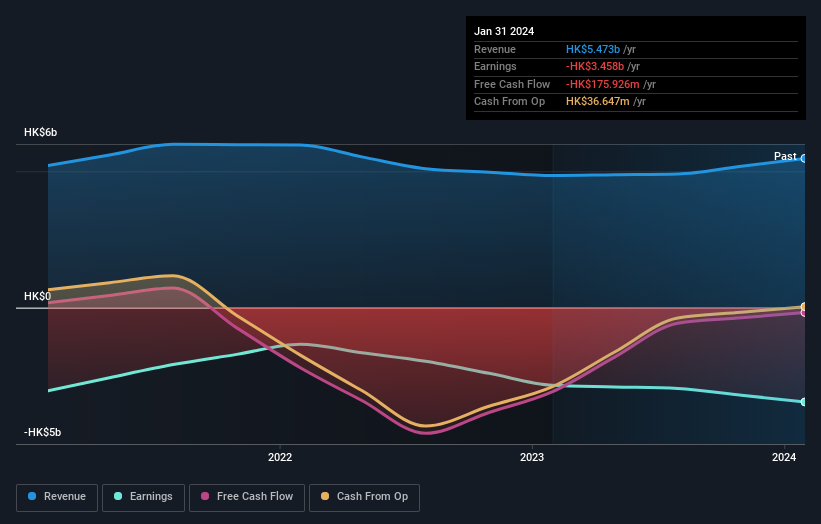Stock Analysis
- Hong Kong
- /
- Real Estate
- /
- SEHK:488
Public companies invested in Lai Sun Development Company Limited (HKG:488) up 11% last week, insiders too were rewarded

Key Insights
- Significant control over Lai Sun Development by public companies implies that the general public has more power to influence management and governance-related decisions
- 56% of the company is held by a single shareholder (Lai Sun Garment (International) Limited)
- Insiders own 19% of Lai Sun Development
If you want to know who really controls Lai Sun Development Company Limited (HKG:488), then you'll have to look at the makeup of its share registry. The group holding the most number of shares in the company, around 56% to be precise, is public companies. Put another way, the group faces the maximum upside potential (or downside risk).
While public companies were the group that benefitted the most from last week’s HK$102m market cap gain, insiders too had a 19% share in those profits.
Let's take a closer look to see what the different types of shareholders can tell us about Lai Sun Development.
View our latest analysis for Lai Sun Development

What Does The Lack Of Institutional Ownership Tell Us About Lai Sun Development?
Institutional investors often avoid companies that are too small, too illiquid or too risky for their tastes. But it's unusual to see larger companies without any institutional investors.
There are multiple explanations for why institutions don't own a stock. The most common is that the company is too small relative to funds under management, so the institution does not bother to look closely at the company. On the other hand, it's always possible that professional investors are avoiding a company because they don't think it's the best place for their money. Lai Sun Development's earnings and revenue track record (below) may not be compelling to institutional investors -- or they simply might not have looked at the business closely.

Hedge funds don't have many shares in Lai Sun Development. Our data shows that Lai Sun Garment (International) Limited is the largest shareholder with 56% of shares outstanding. This implies that they have majority interest control of the future of the company. The second and third largest shareholders are Cheuk Yi Yu and Siu Yuk Yu, with an equal amount of shares to their name at 9.5%.
While it makes sense to study institutional ownership data for a company, it also makes sense to study analyst sentiments to know which way the wind is blowing. As far as we can tell there isn't analyst coverage of the company, so it is probably flying under the radar.
Insider Ownership Of Lai Sun Development
While the precise definition of an insider can be subjective, almost everyone considers board members to be insiders. Management ultimately answers to the board. However, it is not uncommon for managers to be executive board members, especially if they are a founder or the CEO.
I generally consider insider ownership to be a good thing. However, on some occasions it makes it more difficult for other shareholders to hold the board accountable for decisions.
Our information suggests that insiders maintain a significant holding in Lai Sun Development Company Limited. It has a market capitalization of just HK$988m, and insiders have HK$191m worth of shares in their own names. This may suggest that the founders still own a lot of shares. You can click here to see if they have been buying or selling.
General Public Ownership
The general public, who are usually individual investors, hold a 14% stake in Lai Sun Development. While this size of ownership may not be enough to sway a policy decision in their favour, they can still make a collective impact on company policies.
Private Company Ownership
We can see that Private Companies own 11%, of the shares on issue. It's hard to draw any conclusions from this fact alone, so its worth looking into who owns those private companies. Sometimes insiders or other related parties have an interest in shares in a public company through a separate private company.
Public Company Ownership
It appears to us that public companies own 56% of Lai Sun Development. It's hard to say for sure but this suggests they have entwined business interests. This might be a strategic stake, so it's worth watching this space for changes in ownership.
Next Steps:
I find it very interesting to look at who exactly owns a company. But to truly gain insight, we need to consider other information, too. Case in point: We've spotted 3 warning signs for Lai Sun Development you should be aware of, and 2 of them are a bit unpleasant.
If you would prefer check out another company -- one with potentially superior financials -- then do not miss this free list of interesting companies, backed by strong financial data.
NB: Figures in this article are calculated using data from the last twelve months, which refer to the 12-month period ending on the last date of the month the financial statement is dated. This may not be consistent with full year annual report figures.
New: AI Stock Screener & Alerts
Our new AI Stock Screener scans the market every day to uncover opportunities.
• Dividend Powerhouses (3%+ Yield)
• Undervalued Small Caps with Insider Buying
• High growth Tech and AI Companies
Or build your own from over 50 metrics.
Have feedback on this article? Concerned about the content? Get in touch with us directly. Alternatively, email editorial-team (at) simplywallst.com.
This article by Simply Wall St is general in nature. We provide commentary based on historical data and analyst forecasts only using an unbiased methodology and our articles are not intended to be financial advice. It does not constitute a recommendation to buy or sell any stock, and does not take account of your objectives, or your financial situation. We aim to bring you long-term focused analysis driven by fundamental data. Note that our analysis may not factor in the latest price-sensitive company announcements or qualitative material. Simply Wall St has no position in any stocks mentioned.
Have feedback on this article? Concerned about the content? Get in touch with us directly. Alternatively, email editorial-team@simplywallst.com
About SEHK:488
Lai Sun Development
Invests in, develops, leases, and sells real estate properties in Hong Kong, Mainland China, Macau, the United Kingdom, Vietnam, and internationally.
Low and slightly overvalued.

